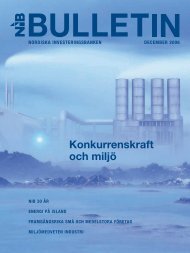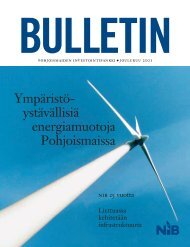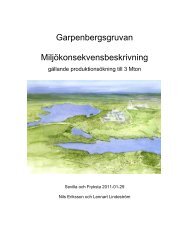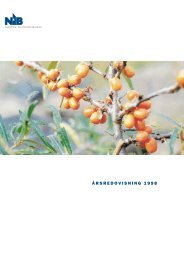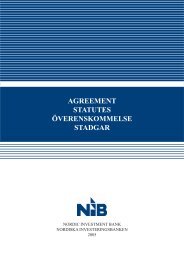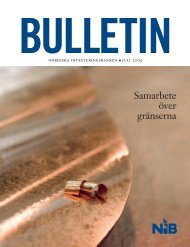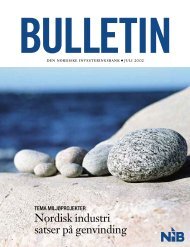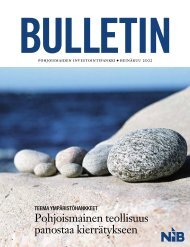BULLETIN
English - Nordic Investment Bank
English - Nordic Investment Bank
- No tags were found...
Create successful ePaper yourself
Turn your PDF publications into a flip-book with our unique Google optimized e-Paper software.
Increased transparency<br />
in financial reporting<br />
Henrik Schütt<br />
will provide readers with a clearer picture<br />
of a company’s profitability and risks. All<br />
financial reports, including interim<br />
reports, are to be prepared in accordance<br />
with IAS.<br />
The transition to the new accounting standard has been a major project since spring 2000,<br />
involving the entire Bank. Pictured seated from the left are Stina Kontro, Marja Tikka, Joneta<br />
Danielsson and Bo Heide-Ottosen. Standing are Torben Nielsen (left) and Kaare Andersen.<br />
THE REQUIREMENTS concerning financial<br />
reporting by companies have been tightened,<br />
which has meant that many companies<br />
are considering adopting new<br />
accounting standards. However, the adoption<br />
of new accounting standards is an<br />
extensive process that requires much<br />
preparation by each company. It is therefore<br />
important to start early.<br />
NIB has complied with International<br />
Accounting Standards (IAS) since 1994.<br />
NIB is also the first bank in the Nordic<br />
region to apply IAS 39 to the financial year<br />
2001. IAS 39 entails new principles for the<br />
treatment of financial instruments including<br />
mor extensive use of fair values.<br />
THE IAS PROJECT at NIB has been a pioneering<br />
venture, involving not only the<br />
Bank’s accounting department, but also the<br />
finance department, the risk management<br />
and IT departments and the Bank’s management<br />
committee. The project has been<br />
a joint project for the entire Bank and has<br />
posed many challenges. Marja Tikka, an<br />
Authorised Public Accountant from Ernst<br />
& Young, has participated as an external<br />
expert in the work of the Bank’s IAS project<br />
team.<br />
Stina Kontro, head of the accounting<br />
department at NIB, feels that the project<br />
has been interesting and rewarding, but<br />
also demanding. “The new standard has<br />
required new accounting practice for NIB.<br />
The problem lies in the fact that there is no<br />
established practice in this area,’’ she says.<br />
“Being one of the first companies to present<br />
financial statements in accordance<br />
with IAS, including IAS 39, has presented a<br />
unique challenge and our solutions will be<br />
interesting to others preparing to make the<br />
transition.”<br />
In accordance with an EU decision, all<br />
listed companies in Europe are to apply IAS<br />
by 2005, in some cases by 2007. The aim is<br />
to increase the transparency of the companies’<br />
financial information and to simplify<br />
comparability. IAS financial statements<br />
THE APPLICATION of IAS 39 primarily entails<br />
a different treatment of derivative contracts,<br />
which are measured at fair value. IAS 39<br />
permits hedge accounting. For NIB, this<br />
means that the effects on the profit and loss<br />
account are minimised. According to<br />
Kontro, the application of IAS 39 has had<br />
only minor effects on the figures reported<br />
by NIB. However, the built-in volatility of<br />
financial instruments is now shown more<br />
clearly than previously.<br />
Joneta Danielsson, of the Bank’s accounting<br />
department, says: “IAS also enhances<br />
the value of the notes to the financial statements.<br />
We have chosen to report value<br />
adjustments due to IAS 39 as separate<br />
items even in the financial statements. The<br />
new financial statements reflect more than<br />
before the current situation, whereas the<br />
figures in the previous accounts stated historical<br />
values.’’<br />
ONE OF THE KEY PEOPLE in the project<br />
team is Marja Tikka, one of the foremost<br />
Nordic experts on IAS. “The IAS project<br />
at NIB has been a success, largely thanks to<br />
the careful preparations begun in time,’’<br />
she says. “Companies need to understand<br />
that the transition to a new accounting<br />
standard involves a lot of work. At the same<br />
time, a major project like this benefits the<br />
entire organisation since it leads to increased<br />
understanding of the other functions.’’<br />
Torben Nielsen and Kaare Andersen at<br />
the Bank’s finance department agree with<br />
Tikka. “The finance department sees how<br />
the transactions made are reflected in the<br />
financial statements. And the accounting<br />
department adopts a completely new<br />
approach involving accounting and reporting<br />
at fair value.’’ ■<br />
bulletin ● july 2002 19




